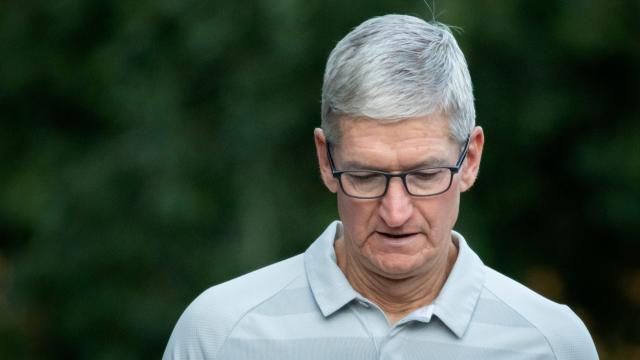Some not-so-great legal news for Apple. For starters, a judge has concluded that Apple CEO Tim Cook should sit for a seven-hour deposition in the upcoming case against Epic Games. Second, Apple’s attempt to subpoena Samsung in the case has also been denied. Womp womp.
According to court documents, Epic Games wanted to depose Cook for a proposed eight hours. Apple then tried to cite the apex doctrine, which in a nutshell prevents a high-level corporate employee from being deposed. Or, you know, zero hours. Apple later offered a concession of four hours. According to Judge Thomas S. Hixon, however, “this dispute is less than meets the eye.” Hixon writes that the apex doctrine “limits the length of a deposition, rather than barring it altogether,” and that given the circumstances, the dispute is a question of whether Cook should be deposed for “four hours, eight hours, or some length of time in between.” Hence, Hixon’s ruling that Cook should be deposed for seven hours.
[referenced id=”1659354″ url=”https://gizmodo.com.au/2020/12/well-well-well-tim-cook-and-craig-federighi-must-testify-in-epic-case/” thumb=”https://gizmodo.com.au/wp-content/uploads/2020/12/18/y0gbx3uqp8gb8uhkpf86-300×168.jpg” title=”Well, Well, Well, Tim Cook and Craig Federighi Must Testify in Epic Case” excerpt=”Yes, Apple and Epic are still in a legal battle over in-app transactions in Fortnite. And apparently, a judge has now ordered both Apple CEO Tim Cook and Craig Federighi, Apple’s perfectly coiffed senior vice president of software engineering, to testify.”]
As for where Hixon got seven hours from, the judge writes it’s the default rule for “how long a witness must suffer being deposed.” Hixon also argues that the apex doctrine focuses on whether a witness has a “unique, non-repetitive knowledge of the facts of the case.” When it comes to Apple’s app store policies — which are at the centre of this seemingly never-ending case against Epic — Hixon writes “there is really no one like Apple’s CEO who can testify about how Apple views competition in these various markets that are core to its business model.”
On the bright side for Cook, Judge Hixon did say that a “deposition of longer than seven hours is unjustified.”
Another blow is Judge Hixon denied Apple’s request to subpoena internal documents from Samsung. Given that Samsung isn’t even involved in Apple and Epic’s beef, Hixon characterised the request as “a quirky deep dive” into Samsung’s relationship with Epic. As for why Apple made the request in the first place, the company alleged that those documents would prove that its App Store’s practices are pretty much the same as everyone else’s. Or put simply, from Apple’s point of view, Epic Games can’t make a convincing antitrust argument if it can prove that Samsung made similar decisions in how it distributes Epic’s Fortnite.
However, Hixon argues that because Epic Games is a Pretty Big Company, whatever arrangement it has with Samsung is unique and “cannot serve as a stand-in for some larger category of market participants.”
It’s hard to say these two rulings are “victories” for Epic, so much as they’re minor setbacks for Apple. Cook could very well be deposed for seven hours, but that doesn’t guarantee the court will side with Epic Games at the end of the day. The Samsung denial, however, might bode poorly for Apple’s other subpoenas for other third parties, including Sony, Microsoft, Nintendo, and Amazon.
In any case, these are just the latest developments in the litany of legal tit-for-tat between Apple and Epic Games since this past summer. A courtroom continuation, you might say, of the ludicrous showmanship that kicked this whole saga off in the first place. As a refresher, in August, Epic introduced direct in-app purchases in Fortnite that sidestepped Apple’s 30% commission for transactions made via the App Store. That led to Apple booting Fortnite from the App Store. In turn, that led to a spicy video from Epic portraying Apple as a dystopian dictator. Which again, led to Apple terminating Epic Games’ App Store developer account.
The drama has died down a bit, as the trial isn’t set to kick off until July. That said, it’s fair to assume that the next few months will still see plenty of passive-aggressive legal back-and-forths as both Epic and Apple try to rack up advantages for their individual cases.
